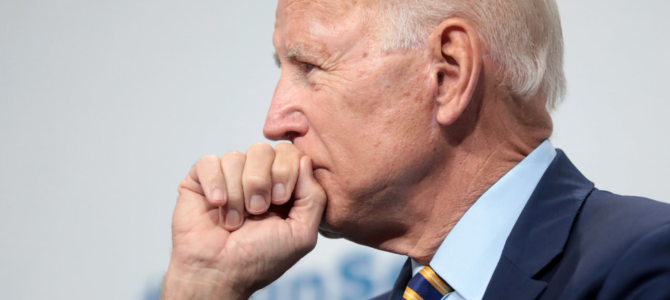
In his Aug. 20 acceptance speech for the Democratic presidential nomination, former Vice President Joe Biden said that on COVID-19, President Donald Trump is “waiting for a miracle.”
“The president keeps telling us the virus is going to disappear,” Biden said. “He keeps waiting for a miracle. Well, I have news for him: no miracle is coming.”
Biden went on to outline his plan for addressing the Wuhan coronavirus, which includes a national mask mandate. He concluded, “As president, I will make you this promise: I will protect America. I will defend us from every attack, seen and unseen, always, without exception, every time.”
Who’s promising a miracle now?
We Are No Better Off for Our COVID-19 Response
In April, I read a poem written shortly after the “15 Days to Slow the Spread” effort began. Titled “History Will Remember,” it celebrated the shutdown as a societal good, one that would eventually lead to the vanquishing of COVID-19 and, beyond that, to a better world:
History will remember when the people fought
For their old and their weak
Protected the vulnerable
By doing nothing at all.
History will remember when the virus left
And the houses opened
And the people came out
And hugged and kissed
And started again
Kinder than before.
It’s a lovely picture, but it’s a mirage. We haven’t come out of our houses, not really. We aren’t hugging and kissing and starting again, and we are not kinder than before.
Instead, we are more isolated and fearful than ever as we continue to physically distance and don our masks and watch our nation crumble. “Fifteen Days to Slow the Spread” turned into “30 Days to Slow the Spread,” which turned into the “new normal” of not merely trying to protect vulnerable populations and prevent our health-care system from being overwhelmed but instead to ensuring no one gets the virus, ever.
I don’t blame Trump for this. COVID-19 is not his fault, nor is it his fault that our culture has become so risk-averse that a president doesn’t have the option, politically, of looking the American people in the eye and saying, “We’ll do what we can to help, but we can’t completely protect you from this, and the effort to do so might cause more harm than good.”
He was truly caught between the rock of the virus and the hard place of economic disaster, and there was no way to win, particularly not given how much the mainstream media despise him. This is why it is so disingenuous of the man whose COVID-19 strategy the Wall Street Journal called “Joe’s Me-Too COVID Plan” because of its similarity to Trump’s plan to suggest that if only he were president, things would be different.
Refuse to Welcome Hell on Earth
Writing at Medium several weeks ago, Katherine Baker described the experience of observing the pandemic from “a place of intimacy with death and mourning.” Five years ago, Baker lost her infant son and her husband in quick succession. Her son did not survive his premature birth, and her husband, an Orthodox priest, died two weeks later in a car accident. Baker says:
In our fear of death we simply do not want to think about what happens after our loved ones die. But we must. We seem to be willing, in our understandable terror, to trade away many essential things: basic freedoms, our public life and public institutions for the promise of greater safety from sickness and death, but when that sickness and death come anyway (as it must), what will we do when we find we have made the world worse than it otherwise might have been? If we trade the beauty and order of our society for safety, not only will we find we have lost our dear ones anyway, we will sit and mourn them in a desolate land of our own making.
There is a dark part of us all that wants the world to match the pain we feel. I think this is the primary work of mourning people: to refuse bitterness, to choose life every moment we can (and repent when we fail) and refuse to make the whole world worse just because we are hurting. The world is already a graveyard; it does not have to be hell.
As we survey the graveyard around us and contemplate all we have lost in the last six months, we need to ask ourselves whether we want it to become more of an earthly hell than it already is. One ancient metaphor for hell depicts it as a place where there is plenty to eat but the only utensils are spoons with handles too long for a person to feed himself. It doesn’t occur to the tenants to use the spoons to feed each other, so they starve.
That’s not too far off from where we find ourselves today. People are all around us, but we can’t touch them. Faces exist beneath the masks, but we can’t see them. Many of our churches and schools have opened, but with half measures that prevent them from fully serving those in their care. We have, within our reach, the tools for what ails us (news flash: It isn’t COVID-19), but we refuse to use them.
Biden is right about one thing: No miracle is coming. The virus is with us and probably will be, in some form, for a long time. This is all the more reason, as our doctors and scientists continue looking for answers, to learn to live with it — not from behind a mask, not six feet removed from our fellow human beings, but from a place of true solidarity, where we can see, touch, smile at, and help each other again.









